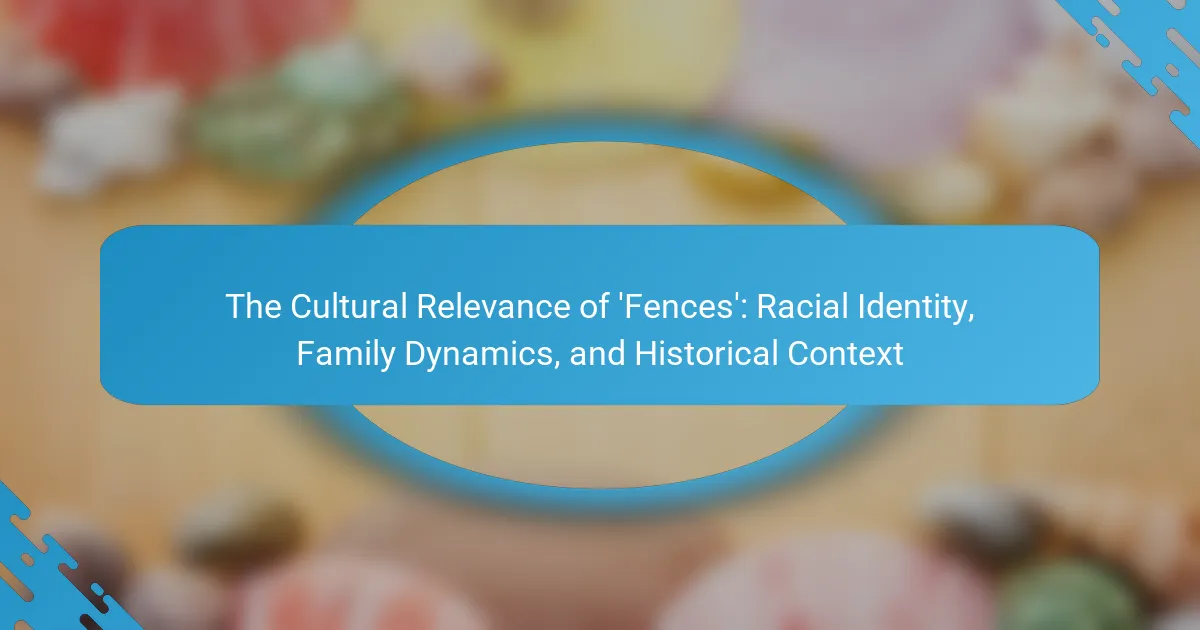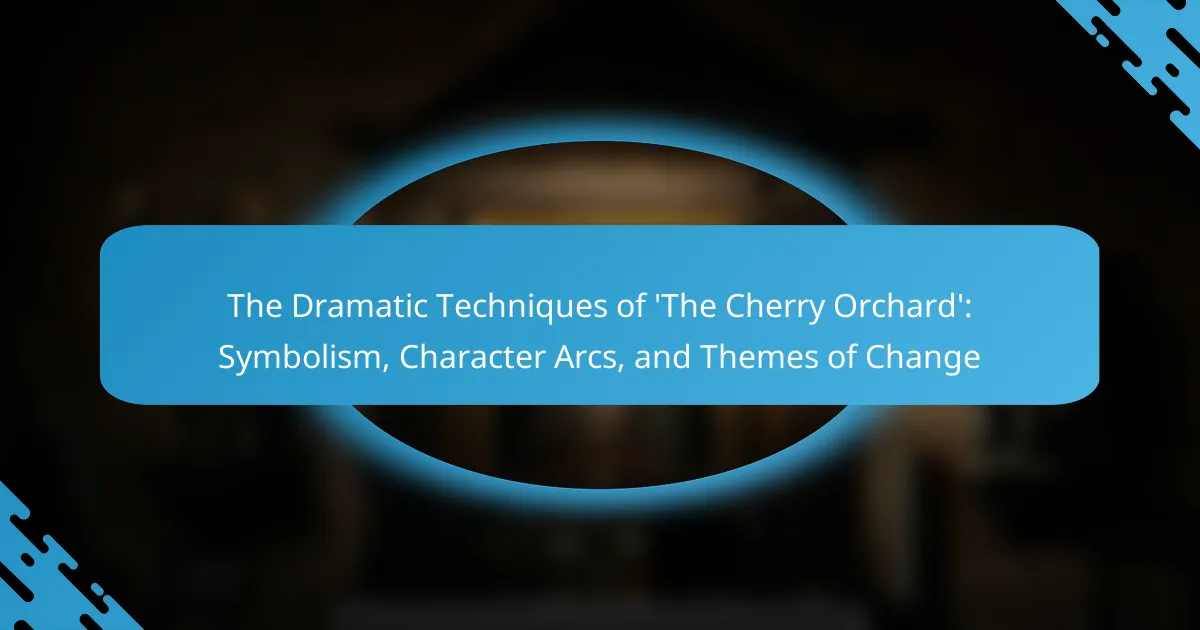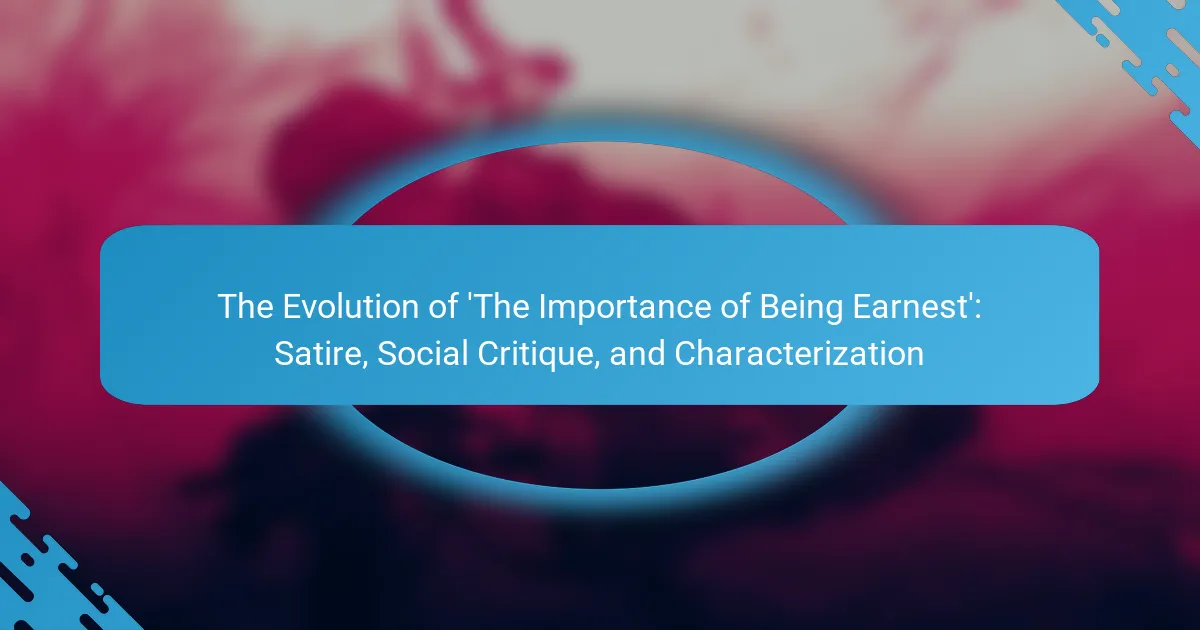‘Oedipus Rex,’ a pivotal work in Greek tragedy by Sophocles, exemplifies the tragic structure while delving into themes of fate, free will, and human suffering. The play introduces tragic irony, where the audience is aware of Oedipus’s doomed fate, contrasting with his ignorance. It raises critical questions about the nature of destiny and personal agency, reflecting on moral integrity and the consequences of hubris. Various interpretations, including psychoanalytic and feminist perspectives, further enrich the understanding of the play’s relevance to human behavior and societal dynamics. The enduring significance of ‘Oedipus Rex’ continues to influence modern storytelling and discussions in literature and philosophy.
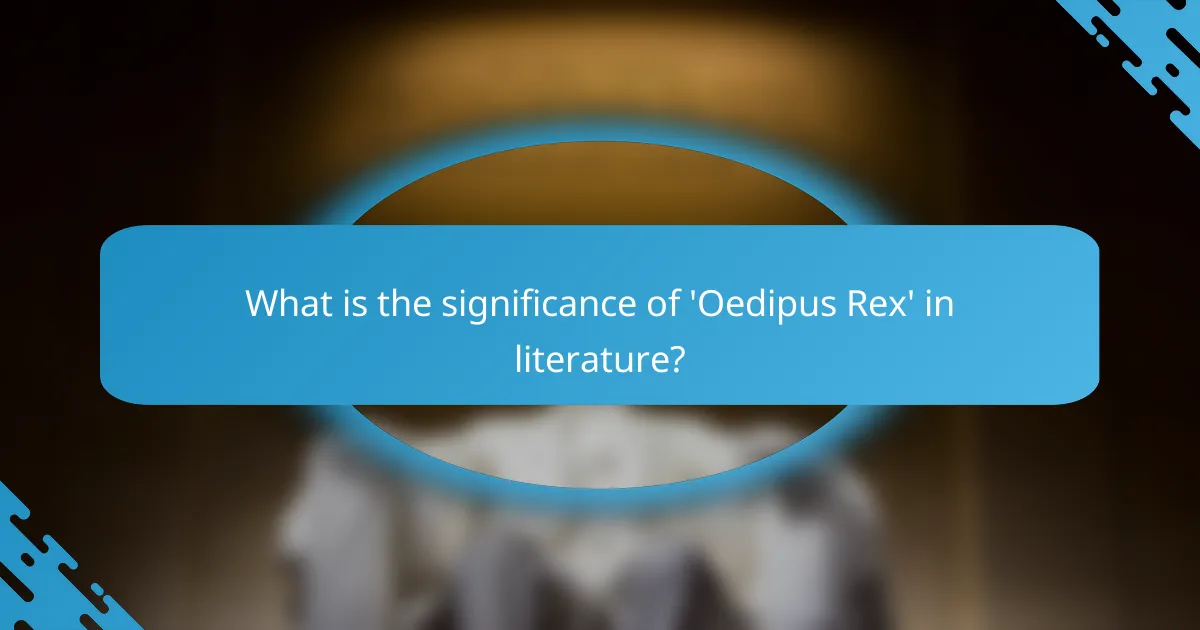
What is the significance of ‘Oedipus Rex’ in literature?
‘Oedipus Rex’ is significant in literature as it exemplifies the tragic structure and explores themes of fate and human suffering. This play, written by Sophocles, is a cornerstone of Greek tragedy. It introduces the concept of tragic irony, where the audience knows the protagonist’s fate while he remains unaware. The narrative illustrates the inescapability of fate, as Oedipus’s attempts to avoid his prophecy lead him to fulfill it. Furthermore, the play raises questions about free will versus destiny, a theme that resonates across various literary works. Its influence extends to modern storytelling, shaping the structure of tragic narratives. ‘Oedipus Rex’ has been studied extensively, highlighting its enduring relevance in discussions of morality and the human condition.
How does ‘Oedipus Rex’ exemplify tragic structure?
‘Oedipus Rex’ exemplifies tragic structure through its adherence to classical elements of tragedy. The play features a noble protagonist, Oedipus, who faces a significant downfall. This downfall stems from a tragic flaw, known as hamartia, which in Oedipus’s case is his hubris. The plot follows a clear arc, beginning with Oedipus’s quest to uncover the truth about his origins. As he discovers his fate, the tension escalates, leading to a moment of anagnorisis, or recognition of his mistakes. The play concludes with a catharsis, evoking pity and fear in the audience. Moreover, the themes of fate and free will are central, illustrating the inevitable consequences of Oedipus’s actions. This structure aligns with Aristotle’s definition of tragedy, emphasizing moral lessons and human suffering.
What are the key elements of the tragic structure in ‘Oedipus Rex’?
The key elements of the tragic structure in ‘Oedipus Rex’ include hamartia, peripeteia, anagnorisis, and catharsis. Hamartia refers to Oedipus’s tragic flaw, which is his hubris. This flaw leads him to make critical mistakes. Peripeteia is the reversal of fortune, where Oedipus transitions from a respected king to a fallen figure. Anagnorisis is the moment of realization when Oedipus discovers his true identity and the consequences of his actions. Finally, catharsis occurs as the audience experiences pity and fear, leading to emotional purification. These elements work together to create a powerful tragic narrative.
How do these elements contribute to the overall impact of the play?
The elements of tragic structure, themes of fate, and cultural significance significantly contribute to the overall impact of ‘Oedipus Rex.’ The tragic structure creates a sense of inevitability, emphasizing the hero’s downfall. This structure engages the audience emotionally, fostering a deep connection to Oedipus’s plight. Themes of fate illustrate the tension between free will and destiny, prompting reflection on human existence. The cultural significance of the play highlights its relevance to ancient Greek society and its exploration of moral and ethical dilemmas. Together, these elements create a powerful narrative that resonates with audiences, making ‘Oedipus Rex’ a timeless work.
What themes of fate are explored in ‘Oedipus Rex’?
‘Oedipus Rex’ explores several key themes of fate. Central to the play is the idea of predestination. Oedipus is doomed to fulfill a prophecy of killing his father and marrying his mother. His attempts to avoid this fate ultimately lead him to fulfill it. Another theme is the conflict between free will and fate. Oedipus believes he can change his destiny through his actions. However, the narrative suggests that fate is inescapable. The play also examines the consequences of trying to defy fate. Oedipus’s tragic downfall illustrates the futility of resisting predetermined outcomes. The themes of fate in ‘Oedipus Rex’ highlight the tension between human agency and the power of destiny.
How does the theme of fate manifest in the characters’ actions?
The theme of fate manifests in the characters’ actions through their attempts to escape predetermined outcomes. In “Oedipus Rex,” Oedipus seeks to avoid the prophecy of killing his father and marrying his mother. His actions, driven by free will, ironically lead him directly to fulfill the prophecy. Jocasta, Oedipus’s wife, also tries to dismiss the oracles, believing she can change fate. This belief ultimately leads to tragic consequences. The characters’ struggles against fate highlight the tension between free will and destiny. Their choices, rather than altering fate, reinforce its inevitability. The play illustrates that fate is an uncontrollable force that shapes their lives, regardless of their intentions.
What role does prophecy play in the unfolding of events?
Prophecy serves as a critical catalyst in the unfolding of events within “Oedipus Rex.” It establishes the framework of fate that the characters cannot escape. The prophecy foretells Oedipus’s tragic destiny, which drives his actions throughout the narrative. As Oedipus seeks to avoid his foretold fate, he inadvertently fulfills it. This paradox emphasizes the theme of predestination versus free will. The characters’ responses to the prophecy shape their choices and lead to their downfalls. Ultimately, the prophecy underscores the inevitability of fate in the tragic structure of the play. This interplay between prophecy and action illustrates the cultural significance of fate in ancient Greek literature.
What cultural significance does ‘Oedipus Rex’ hold?
‘Oedipus Rex’ holds significant cultural importance as a foundational work of Western literature. The play explores themes of fate, free will, and tragic flaw. It illustrates the consequences of human actions against predetermined destiny. This tragedy has influenced countless writers and thinkers throughout history. Its exploration of moral and ethical dilemmas remains relevant today. Additionally, ‘Oedipus Rex’ has shaped the genre of tragedy in drama. The concept of the tragic hero is largely derived from this work. Its impact on psychology, particularly the Oedipus complex, further underscores its cultural significance.
How has ‘Oedipus Rex’ influenced modern storytelling?
‘Oedipus Rex’ has significantly influenced modern storytelling through its exploration of tragic structure and themes of fate. This ancient Greek tragedy established the archetypal tragic hero, whose downfall is often due to a fatal flaw. Modern narratives frequently mirror this structure, showcasing protagonists who face inevitable consequences of their actions.
The themes of fate and free will in ‘Oedipus Rex’ resonate in contemporary stories, prompting characters to grapple with their destinies. This has led to a deeper exploration of moral ambiguity in modern literature and film. The play’s impact can be seen in works such as Shakespeare’s tragedies and contemporary psychological dramas.
Additionally, the concept of dramatic irony in ‘Oedipus Rex’ has been widely adopted. Audiences are often aware of the character’s fate before they are, creating tension and engagement. This technique is prevalent in modern storytelling, enhancing emotional depth and complexity.
The legacy of ‘Oedipus Rex’ is evident in various genres, from literature to film, emphasizing its enduring relevance in shaping narrative conventions.
What lessons does ‘Oedipus Rex’ impart about human nature?
‘Oedipus Rex’ imparts lessons about the complexities of human nature, particularly regarding fate and self-awareness. The play illustrates that humans often struggle against their predetermined destinies. Oedipus’s attempts to escape his fate ultimately lead him to fulfill it. This highlights the futility of trying to control one’s destiny. Additionally, the play emphasizes the importance of self-knowledge. Oedipus’s ignorance of his true identity leads to tragic consequences. The narrative warns that lack of insight into oneself can result in devastating outcomes. Overall, ‘Oedipus Rex’ reveals that human nature is marked by a tension between free will and fate.
How does ‘Oedipus Rex’ connect to contemporary themes?
‘Oedipus Rex’ connects to contemporary themes through its exploration of fate, identity, and moral responsibility. The play illustrates how individuals grapple with their destinies, a theme prevalent in modern discussions about free will versus determinism. It also delves into the complexities of self-discovery and the consequences of one’s actions. Contemporary society often mirrors Oedipus’s journey of uncovering painful truths about oneself. The narrative emphasizes the importance of accountability, highlighting how personal choices can lead to tragic outcomes. These themes resonate in today’s context, where individuals face moral dilemmas and the impact of their decisions. Additionally, the play’s exploration of societal and familial obligations remains relevant, reflecting ongoing conversations about duty and sacrifice in modern relationships.
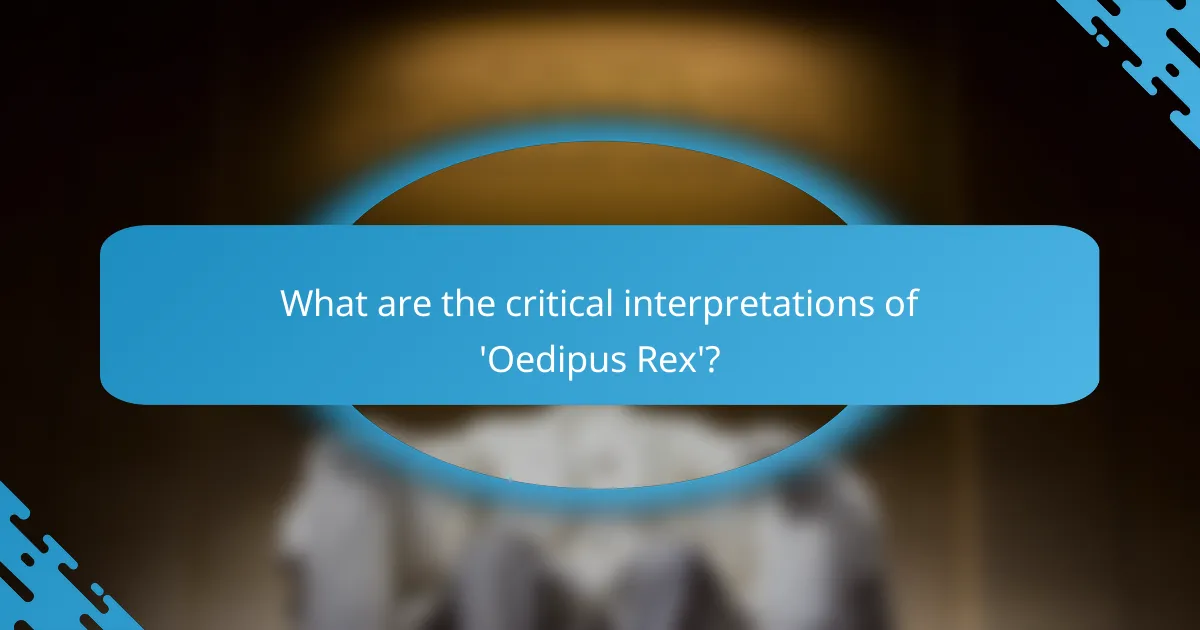
What are the critical interpretations of ‘Oedipus Rex’?
Critical interpretations of ‘Oedipus Rex’ include themes of fate, free will, and tragic flaw. Scholars debate whether Oedipus is a victim of fate or an agent of his own downfall. The concept of tragic irony is central, as Oedipus seeks to avoid his prophecy but inadvertently fulfills it. Psychoanalytic interpretations often explore Oedipus as a symbol of human desire and conflict, particularly in relation to familial bonds. Feminist readings critique the portrayal of women, particularly Jocasta, highlighting gender dynamics. Historical context emphasizes the play’s reflection on Greek society and moral order. Each interpretation contributes to a deeper understanding of the play’s enduring significance in literature and philosophy.
How have scholars analyzed the tragic elements of ‘Oedipus Rex’?
Scholars have analyzed the tragic elements of ‘Oedipus Rex’ through the lens of Aristotle’s definition of tragedy. They emphasize the concepts of hamartia, anagnorisis, and peripeteia. Hamartia refers to Oedipus’s tragic flaw, which leads to his downfall. Anagnorisis is the moment of realization when Oedipus discovers his true identity. Peripeteia is the reversal of fortune that results from his actions.
Additionally, scholars explore the theme of fate versus free will. They argue that Oedipus’s attempts to escape his fate ultimately fulfill the prophecy. This tension between predestination and personal choice is a focal point in tragic analysis.
Furthermore, the emotional impact on the audience is a significant aspect. The concept of catharsis, or emotional purging, is highlighted as a crucial element of the play’s tragic structure. Scholars note how the audience experiences pity and fear throughout the narrative.
Overall, the tragic elements of ‘Oedipus Rex’ are intricately linked to its exploration of human nature and the consequences of knowledge and ignorance.
What are the most prominent scholarly perspectives on its tragedy?
Prominent scholarly perspectives on the tragedy of ‘Oedipus Rex’ include the views of Aristotle, Freud, and modern critics. Aristotle’s perspective emphasizes the concept of catharsis, where the audience experiences a purging of emotions through pity and fear. Sigmund Freud interprets the tragedy through the lens of psychoanalysis, focusing on the Oedipus complex and its implications for human psychology. Modern critics often explore themes of fate versus free will, highlighting the inevitability of Oedipus’s downfall due to prophetic destiny. These perspectives contribute to a comprehensive understanding of the play’s enduring significance in literature and philosophy.
How do these interpretations enhance our understanding of the play?
Interpretations of ‘Oedipus Rex’ deepen our understanding of its tragic structure and themes. They reveal the complexity of fate versus free will within the narrative. Different perspectives highlight the cultural significance of the play in ancient Greek society. For example, interpretations focusing on fate illustrate how characters are bound by destiny. This aligns with the historical context of Greek tragedy, emphasizing human limitations. Additionally, psychological interpretations explore Oedipus’ internal conflicts, enhancing character depth. Such analyses contribute to a richer appreciation of the play’s moral and philosophical questions. Overall, these interpretations foster a comprehensive view of its enduring relevance.
What psychological insights can be drawn from ‘Oedipus Rex’?
‘Oedipus Rex’ illustrates profound psychological insights, particularly regarding fate and self-discovery. The character Oedipus embodies the struggle between free will and predestined outcomes. His journey reveals the psychological concept of the Oedipus complex, which Freud identified as a child’s unconscious desire for the opposite-[censured] parent. The play also explores themes of blindness and insight, demonstrating how ignorance can lead to tragic consequences. Oedipus’s eventual realization of his true identity triggers a psychological breakdown, highlighting the impact of truth on the human psyche. His tragic fate serves as a cautionary tale about the limits of human understanding and the inevitability of fate. These insights remain relevant in discussions of human behavior and motivation.
How does the play explore concepts of guilt and responsibility?
The play “Oedipus Rex” explores concepts of guilt and responsibility through the protagonist’s journey of self-discovery. Oedipus’s quest for truth leads him to uncover his own culpability in the tragic events that unfold. His initial ignorance reflects a common human tendency to evade responsibility. As the narrative progresses, Oedipus confronts the reality of his actions and their consequences. This confrontation illustrates the weight of guilt that comes from unintentional wrongdoing. The play emphasizes that knowledge brings accountability, as Oedipus realizes he has fulfilled the prophecy he sought to avoid. His tragic downfall serves as a powerful commentary on the inevitability of fate and the moral implications of one’s choices. Ultimately, “Oedipus Rex” presents guilt as an inescapable burden tied to personal responsibility.
What psychological theories align with the themes presented in the play?
Freudian psychoanalysis aligns with the themes presented in ‘Oedipus Rex’. This theory explores the Oedipus complex, where a son has unconscious desires for his mother and rivalry with his father. The play’s central conflict embodies this complex, as Oedipus unknowingly kills his father and marries his mother. Additionally, Jungian psychology relates to the concept of archetypes and the collective unconscious. Oedipus represents the tragic hero archetype, reflecting universal themes of fate and self-discovery. These psychological frameworks provide a deeper understanding of the characters’ motivations and the play’s enduring significance.
How does the historical context of ‘Oedipus Rex’ shape its themes?
The historical context of ‘Oedipus Rex’ significantly shapes its themes of fate and free will. Written during the height of Athenian democracy in the 5th century BCE, the play reflects societal beliefs about destiny. The Greeks held a strong belief in the power of the gods and fate, which is evident in the play’s plot. Oedipus’s tragic downfall is a direct result of his attempts to escape his prophesied fate. This highlights the theme of inevitability, suggesting that human efforts are futile against divine will. The context of Greek tragedy also emphasizes moral lessons about hubris and the limits of human understanding. The societal norms of the time reinforced the idea that individuals must accept their fate. Thus, the historical backdrop of ‘Oedipus Rex’ enriches its exploration of these enduring themes.
What cultural factors influenced Sophocles’ writing?
Sophocles’ writing was influenced by the cultural context of ancient Greece. The political landscape of Athens during his lifetime shaped his themes. Athenian democracy encouraged exploration of individual versus state conflicts. Religious beliefs in fate and the gods permeated his narratives. The importance of public performance in festivals influenced his dramatic structure. The societal norms regarding morality and ethics were reflected in his characters. His works often addressed human suffering and the quest for truth. The cultural appreciation for tragedy as a form of art shaped his storytelling techniques.
How does understanding the historical context enhance its relevance today?
Understanding the historical context of ‘Oedipus Rex’ enhances its relevance today by illuminating the themes of fate and human agency. The play, written by Sophocles in the 5th century BCE, reflects the beliefs of ancient Greek society regarding destiny and moral responsibility. These themes resonate with contemporary audiences as they grapple with similar questions about free will and consequences.
The historical context reveals how the Greeks viewed tragedy as a means to explore human suffering and ethical dilemmas. This understanding allows modern viewers to appreciate the depth of the characters’ struggles. For instance, Oedipus’s quest for truth leads to his downfall, mirroring today’s challenges in seeking knowledge and facing its repercussions.
Moreover, recognizing the cultural significance of the play in ancient Greece underscores its lasting impact on literature and philosophy. The exploration of fate versus free will continues to be relevant in discussions of ethics and psychology today. Thus, the historical context not only enriches the understanding of ‘Oedipus Rex’ but also connects its themes to ongoing societal issues.
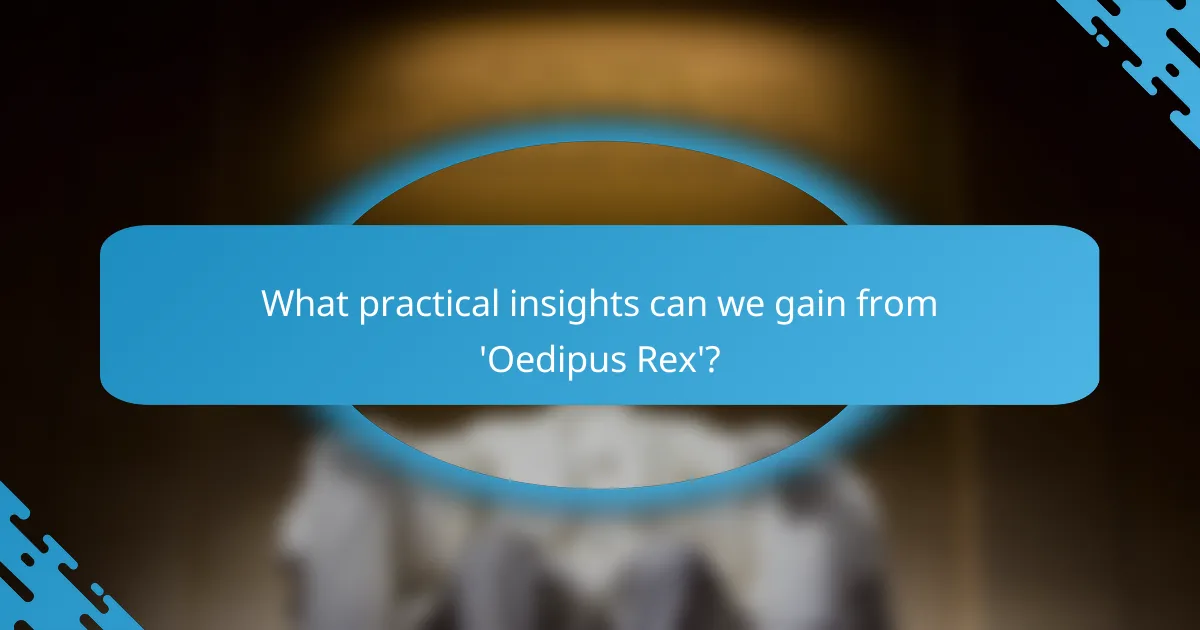
What practical insights can we gain from ‘Oedipus Rex’?
‘Oedipus Rex’ offers insights into the complexities of human nature and the consequences of fate. The play illustrates how ignorance and denial can lead to tragic outcomes. Oedipus’s quest for truth ultimately results in his downfall. This emphasizes the importance of self-awareness and accepting one’s reality. The theme of fate versus free will raises questions about personal responsibility. It suggests that individuals may be powerless against predetermined destinies. Additionally, the play highlights the significance of moral integrity and the consequences of hubris. Oedipus’s arrogance blinds him to the truth, showcasing the dangers of pride. These insights remain relevant in understanding human behavior and societal dynamics.
How can the themes of ‘Oedipus Rex’ be applied to modern life?
The themes of ‘Oedipus Rex’ can be applied to modern life through the exploration of fate, self-awareness, and moral responsibility. The theme of fate illustrates how individuals may struggle against predetermined paths. In contemporary contexts, this can be seen in the tension between personal choices and societal expectations. Self-awareness is critical in modern life, as it encourages individuals to confront their flaws and limitations, mirroring Oedipus’s tragic realization of his own identity. Moral responsibility highlights the consequences of one’s actions, relevant in today’s discussions about accountability in personal and professional spheres. The tragic downfall of Oedipus serves as a cautionary tale about the dangers of ignorance and hubris, urging individuals to seek truth and understanding in their lives.
What lessons about fate and choice can we learn from the play?
The play teaches that fate is an unavoidable force. Characters are often powerless against predetermined outcomes. Oedipus’s attempts to escape his fate only lead him closer to it. This illustrates the futility of resisting destiny. Choice plays a crucial role in how characters respond to their fate. Oedipus makes choices that contribute to his tragic end. His arrogance and determination to uncover the truth lead to his downfall. The play suggests that while fate is fixed, personal choices can influence the experience of that fate. Ultimately, the interplay of fate and choice highlights the complexity of human existence and moral responsibility.
How can we apply the insights from ‘Oedipus Rex’ to personal growth?
Insights from ‘Oedipus Rex’ can be applied to personal growth by emphasizing self-awareness and the acceptance of one’s limitations. The tragedy illustrates the consequences of ignorance and the importance of seeking truth. Oedipus’s journey reveals how denial can lead to destructive outcomes. By recognizing one’s flaws, individuals can foster personal development. The play also highlights the inevitability of fate, encouraging people to take responsibility for their choices. Engaging with these themes promotes resilience and adaptability in the face of challenges. Understanding the impact of one’s actions fosters a deeper connection with oneself and others.
‘Oedipus Rex’ is the central entity of this article, recognized for its significant impact on literature through its tragic structure, exploration of fate, and cultural relevance. The article outlines how the play exemplifies classic tragedy elements, such as hamartia, anagnorisis, and catharsis, while delving into themes of fate versus free will and the consequences of human actions. It also examines the cultural significance of ‘Oedipus Rex’ in shaping modern storytelling and its psychological insights regarding human nature, guilt, and responsibility. The discussion highlights critical interpretations and the historical context that enhance the play’s enduring relevance in contemporary society.
